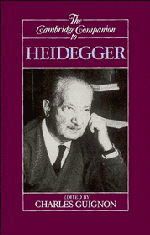Book contents
- Frontmatter
- Introduction
- 1 The question of being
- 2 Reading a life
- 3 The unity of Heidegger's thought
- 4 Intentionality and world
- 5 Time and phenomenology in Husserl and Heidegger
- 6 Heidegger and the hermeneutic turn
- 7 Death, time, history
- 8 Authenticity, moral values, and psychotherapy
- 9 Heidegger, Buddhism, and deep ecology
- 10 Heidegger and theology
- 11 Heidegger on the connection between nihilism, art, technology, and politics
- 12 Engaged agency and background in Heidegger
- 13 Wittgenstein, Heidegger, and the reification of language
- Bibliography
- Index
2 - Reading a life
Heidegger and hard times
Published online by Cambridge University Press: 28 May 2006
- Frontmatter
- Introduction
- 1 The question of being
- 2 Reading a life
- 3 The unity of Heidegger's thought
- 4 Intentionality and world
- 5 Time and phenomenology in Husserl and Heidegger
- 6 Heidegger and the hermeneutic turn
- 7 Death, time, history
- 8 Authenticity, moral values, and psychotherapy
- 9 Heidegger, Buddhism, and deep ecology
- 10 Heidegger and theology
- 11 Heidegger on the connection between nihilism, art, technology, and politics
- 12 Engaged agency and background in Heidegger
- 13 Wittgenstein, Heidegger, and the reification of language
- Bibliography
- Index
Summary
THE END OF A CATHOLIC PHILOSOPHER
It was just before Christinas Eve - Monday, December 23, 1918 - when the young Mrs. Heidegger, eight months pregnant, decided to brave Freiburg's bitterly cold weather, travel across town, and break the bad news to Father Krebs. Engelbert Krebs, a Catholic priest and professor of theology at Freiburg University, was a close friend of her husband, the philosophy lecturer Martin Heidegger. In fact, Krebs had officiated at the Heideggers' Catholic wedding in Freiburg Cathedral on March 21, 1917.
At the time of that wedding Father Krebs had already been skeptical. It was a confessionally “mixed” marriage - Elfride Petri was a Lutheran, Martin Heidegger a Catholic - and even though the bride had solemnly declared her intention to convert to Catholicism and raise her children in the Roman faith, Father Krebs had had his doubts. Therefore, he was not entirely surprised when, a year and a half later, the 24-year-old mother-to-be sat across from him in his office and poured out her feelings:
My husband has lost his church faith, and I have not found mine. At the time of our marriage, his faith was already undermined by doubts. But I insisted on the Catholic wedding, hoping that with his help I would find faith. We have read, spoken, thought, and prayed a great deal together, and the result is that both of us now think only as Protestants - that is: we believe in a personal God and pray to Him, but without any dogmatic ties and apart from Protestant or Catholic orthodoxy. Under these circumstances, we would consider it dishonest to let our child be baptized in the Catholic church. But I felt it was my duty to tell you this beforehand.
- Type
- Chapter
- Information
- The Cambridge Companion to Heidegger , pp. 70 - 96Publisher: Cambridge University PressPrint publication year: 1993
- 5
- Cited by



